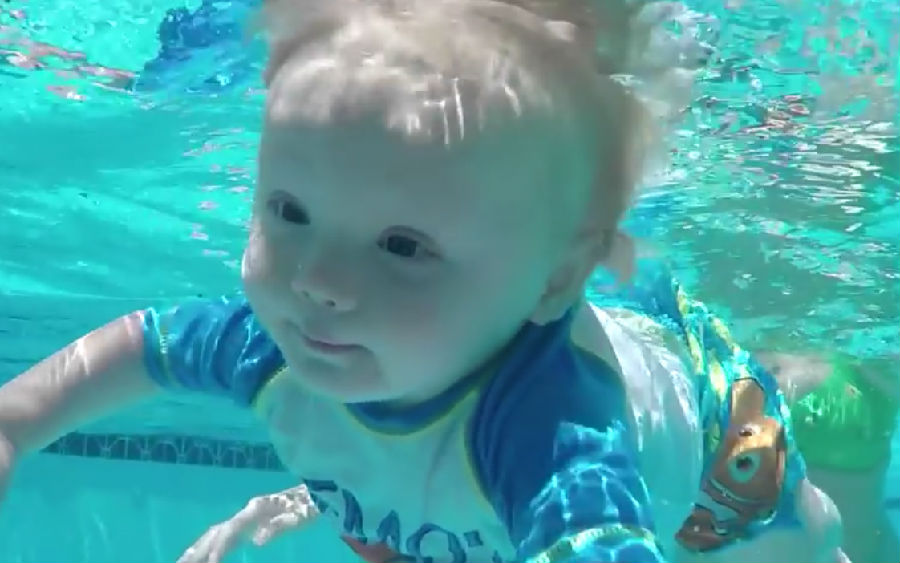What is the earliest age that a baby can learn how to swim?
婴儿最早可以什么时候开始学游泳呢?
My family has been testing this with my nephew.
我们家一直都在用我侄子试验这个问题。
He was only 6 months old when we enrolled him in classes with a group called Infant Swimming Resource.
我们给他报“婴儿游泳自救课程”(简称“ISR”)的时候他才6个月大。
Now, of course he's not "swimming."
当然了,那个时候他还称不上是在“游泳”。
babies this young aren’t developmentally ready to move themselves forward through the water.
因为这个年龄的婴儿还没有发育到能够自己在水中向前游动。
Instead the goal was to teach him to survive.
相反,这个课程的目标是为了教他如何自救。
I have to say I was a bit skeptical when I first saw these clips.
不得不说,第一次看到这个视频的时候,我是很怀疑的。
How could a baby who can’t even walk or talk learn how to float.
一个连走路和说话都不会的婴儿怎么可能学得会水上漂呢。
I mean, it kind of looks like torture.
讲真,这个课程看着还有种折磨孩子的感觉。
But before a month had passed, my nephew proved me wrong.
然而,一个月过去了,我的侄子证明我错了。
Every day 2 American families lose a child to drowning.
平均每天都有2个美国家庭的孩子溺水。
Drowning deaths are declining overall, but it is still the #1 killer of kids ages 1-4, aside from birth defects.
尽管1-4岁的孩子溺水身亡的几率总体呈下降趋势,但溺水对他们来说仍然是先天缺陷以外的头号杀手。
And Arizona, where my nephew lives, has a higher drowning rate than average,
而我侄子所在的亚利桑那州婴幼儿溺水的几率比平均水平还要高,
which isn't surprising given that in the Phoenix area, 43% of homes have a swimming pool.
考虑到亚利桑那州凤凰城43%的家庭都拥有家庭泳池,也就不奇怪了。
These classes they put my nephew in should really be the 3rd line of defense.
他们给我侄子安排的这些课程其实算得上是他们安排的第三道防线。
The first is a fence wraps around the pool latches shut, second is constant supervision.
另外两道防线是泳池周围都有围栏以及老师们的不断监督。
But if those safeguards fail and a baby slips into the water, it sounds kind of farfetched,
然而,如果这些保护措施没起到作用导致有婴儿不慎落水的话,听起来好像不大可能哈,
but the question is what skills, if any, can the baby use to keep itself alive?
这个时候的问题就是,哪些技能能够帮助婴儿自救呢?
That’s where ISR comes in.
这时,ISR课程的作用就突显出来了:
“It’s completely different than other programs that are out there.”
“我们这个课程跟外面的其他课程完全不一样。”
This is Jennifer, one of my nephew’s instructors.
这是詹妮弗,我侄子的游泳教练之一。
“They are working really really hard. There’s not a lot of singing and games even though there’s a ton of positive reinforcement.”
“我们的老师工作都非常非常认真。我们有各种各样的积极措施,但我们不搞那些歌唱和游戏之类的活动。”
She told me that unlike other programs where kids might play in the pool or use floaties,
她告诉我,与其他可供孩子在游泳池玩耍或使用浮木的课程不同,
ISR classes are geared entirely toward preparing a baby for an emergency situation.
ISR课程完全是为了让宝宝能够做好应对紧急情况的准备。

The instructor is shaping his behavior through basic operant conditioning.
教练会先通过操作制约机制培养宝宝的条件反射。
When he positions his body correctly in a float, that behavior is reinforced with a good breath of air and with her picking him up.
当他能够正确地浮在水上时,随着呼吸的调整以及教练的协助,他的条件反射会变得更加自如。
They did this every day for a few weeks and by the end my nephew could put himself into a float after being tipped in face-down.
这样每天训练一次,几周下来,在被教练倒着翻到水里以后,我侄子已经能够自己漂在水上了。
They also tested him with clothes on because in most drowning situations, the child is clothed.
他们还在他穿着衣服的状态下对他进行测试,因为大多数溺水的时候孩子都是穿着衣服的。
Now that he’s 1 year old and he's walking, he’s enrolled in the second set of lessons,
现在他已经1岁了,已经在学走路了,我们也给他报了第二套课程,
which teaches him to look for the stairs and swim toward them under water, taking breaks to float when he needs air on the way.
教他如何在水下找台阶然后往台阶游,以便他在需要的时候可以游到那边去换气。
So is all of this good for him? Some people might think that this type of lesson is traumatizing.
那……这些课程真的有用吗?有人担心这种课程会给宝宝们留下阴影。
I mean, My nephew certainly doesn't like the lessons, and doesn't really like Jennifer.
讲真,我的侄子显然是不喜欢这些课程的,也不太喜欢詹妮弗。
“You know, if they're not happy with me, I’m the teacher, I’m the bad guy.
“如果他们对我不满,我是老师,是亏爱人。
But just as long as they’re successful in all the skills that are being taught.”
但只要他们能够成功掌握这些课程我就无所谓。
He never developed a fear of the pool.
他从未都不害怕泳池。
And his tears don’t seem that different from the ones that come when he doesn’t want to take a nap.
而且,他上游泳课流的眼泪和他不想睡觉时流的眼泪看起来也并没什么不同。
They also keep the lessons to just 10 minutes a day in order to reduce any health risks associated with having infant in the pool.
老师们还将课程时间控制在了每天10分钟以内,以缩小婴儿在泳池中的健康风险。
Now the American Academy of Pediatrics says that swimming lessons for kids 1 year and up can be effective in preventing drownings,
美国儿科学会说,1岁及以上的儿童游泳课可以有效预防溺水,
but they don’t support programs for babies younger than that.
但他们不支持那些针对年龄更小的婴儿的游泳课程。
“The water-survival skills programs for infants may make compelling videos for the Internet,
“婴儿水中生存技能培训课或许可以在网上火一把,
but no scientific study has yet demonstrated these classes are effective.”
但我们还没有找到证明这些课程有效的科学依据。”
What they’re really worried about is that these classes could give parents a false sense of security -
其实,他们真正担心的是,这些课程可能会给父母带来一种虚假的安全感 -
if they made parents even a little less vigilant, they would do more harm than good.
如果这些课程降低了父母的警惕性,那么这些课程就弊大于利。
So the doctors are waiting for more data.
所以医生们也在等待更多数据的出现。
But for my family, there’s kind of only one data point that we really care about right now.
但对于我们家来说,我们现在真正关心的只有一个。
The #1 goal is to make sure he'll really be tested.
那就是我们的首要目标是确保他不会真的遇到溺水的问题。
But if my nephew does find himself suddenly under water, it won’t be the first time that he’s had to find his way back up.
但如果我侄子真的发现自己掉到了水里,那将不再是他第一次自己找到出水之路的经历了。











